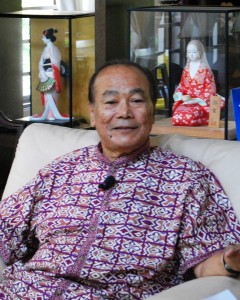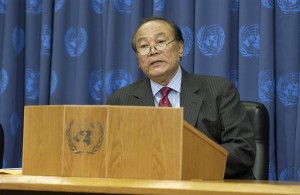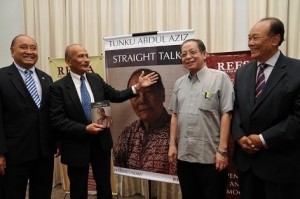UMNO wanted to draft him when he came back from university, but Tunku Abdul Aziz preferred to assert his independence. He spent decades building a reputation as a campaigner for transparency and good governance, notably through his work with Transparency International and the United Nations. The writer and current DAP Vice Chairman tells the Rocket’s Chung Hosanna about mainstreaming the DAP, taking the middle path, and why Malays have nothing to fear from English medium education.
 You have been monitoring the party for 20 years before you joined it, how do you think the face of the party has changed over the years?
You have been monitoring the party for 20 years before you joined it, how do you think the face of the party has changed over the years?
Originally the party was a Chinese party, there’s no question of that. No use pretending. It was chauvinistic, fighting for Chinese causes. But that generation of people is gone, they are no longer in the party. Now it’s different. People like Lim Kit Siang and Lim Guan Eng truly believe the only way you can make an impact politically and socially is by practicing multi-racialism and multi-culturalism. We are no longer looking after the interest of one race, we are all Malaysians.
This is why I support 1Malaysia, but not (the 1 Malaysia slogan) as articulated by Najib. The idea of 1 Malaysia is good. This is what we want. But the implementation, what do they mean by 1 Malaysia?
I have always believed in what Lee Kuan Yew used to say: a Malaysian Malaysia. This is different from the idea of 1 Malaysia. It means the country belongs to all of us, all Malaysians. If we believe that the country belongs to all Malaysians, then we must have policies which unite us, and not policies that divide us. If our policies are not right, if we don’t have the same purposes.
How is this different from what BN is doing? They also claim to represent all Malaysians.
The test of the pudding is in the eating. You can say the pudding is good, but how do I know this is good unless I can taste it? If it only sounds good, we have to test it. There is no way that we can all be together in a small country, and Malaysia is a small country. If we cannot agree, then it’s difficult (susahlah).
Has the party gone through an evolution over the decades?
Certainly, I think the DAP of the past was a totally different party. It was regarded as just a bunch of street fighters, very rough, very crude. I think the problems between the Malays and Chinese at that time was nothing to do with race. It’s about culture. The Malay culture is very different – very gentle, very soft. The approach is different. They saw the Chinese at that time as being very rough. They were street fighters. So the Malays didn’t like what they saw.
But today our party is totally different. We’ve a lot of educated people in our party. Education has changed the DAP. No longer do we have in the leadership people who were not really attuned to the demands of a new Malaysia.
We don’t expect to live and stay in each other’s pockets. You can live your own lives. We’re not talking about assimilation, we’re talking about integration. If you insist on assimilation, Chinese have to assimilate like in Indonesia and Thailand. Even your name must be an Indonesian or Thai name. But this doesn’t happen here. Culturally, we cannot become someone else. But that does not mean we cannot work together. We have to integrate.
Would it be fair to say that if the DAP today were the same as it was 30 years ago, you would not be interested to join it?
Definitely. Because I’ve always been anti race-based politics. If DAP had not changed and shown that it is truly a Malaysian party, I think I would not have come near DAP. But then when you see the leadership of the party today, Kit Siang, Guan Eng, you realize that these people are serious about making DAP a multi-racial party. They want the country to be truly a Malaysian nation.
What do the Malays think about DAP?
Many Malays think of DAP as a Chinese party, they associate it with communism. Malays don’t make a distinction between socialists and communists. (laughs)
It’s hard to change people’s mindset, especially those from the kampungs. The party has evolved over the years but people still have an entrenched mindset. “How can we trust them?” is the biggest question. They want to see (assurances) with their own eyes. We have to make policies which show that as a party, we are color blind and help everyone in need. Talk about helping the poor of all races.
Guan Eng went to prison for 18 months to fight for justice for a Malay girl. That is something that I think does stick in people’s minds. We don’t do it because a Chinese girl has been victimized, we do it for every person who has been victimized. All of this, people see it. They know who is helping them.
Where were you during May 13?
I was not in Malaysia at the time. I was in England for work and had stayed on for a two-week holiday when it happened. I heard stories of what happened. My brother, who was then a young police officer, went to Jalan Ipoh. A group of parang-wielding Malays came out. When they saw him, they said, “Baguslah (good), a Malay officer is here.” He said to them, “Go home, or I will shoot”. He stood his ground. After the mob left, one by one, Chinese kids started coming out of the tin mine pool where they had been hiding.
It was a difficult situation. The policemen had to do their jobs, to protect life and property. As an officer, you are sworn to protect life and property, you have to be fair to all races.
 What about mainstreaming the DAP, does DAP need mainstreaming?
What about mainstreaming the DAP, does DAP need mainstreaming?
I feel we have to reach out to our membership and beyond, to the country as a whole. We must show them that this is our philosophy, that we want to achieve a united Malaysian nation.
We should consider setting up (organisations for) national unity and political education so that people understand the wider issues of being part of Malaysia. We want the Malays to think beyond Malayness and the Chinese to think beyond Chineseness, etc.
We must get people to understand the benefits which multiracialism offers as opposed to exclusiveness. In other words, exclusiveness is the message that “we don’t want others to come into our society”. Malay society should not be a closed society. We should all be open societies.
So, it’s about broadening the appeal beyond the traditional supporters?
That’s right, but they require education in living together with the people outside their society, with whom they have never had any contact. If you go to some kampungs, the Malays would only have met Chinese people in sundry shops – that is their only contact. So they don’t know and don’t understand what the Chinese are thinking.
But if we look at it, what the Malays and Chinese and every race wants at the basic level is all the same. We want security, a roof over our heads, a good education for our children. We want freedom to earn a living without interference. These are the basic expectations as rakyat (citizen of) Malaysia, of any race. We have to reach out to tell the Malays, Chinese, that this is what we all have to do. But this will take time.
A friend of mine met a Malay physiotherapist in Selayang hospital who told him about her desire to help all patients who come to the hospital. She said, “there are days when I cannot help, because the patient does not speak a word of Malay or English.” These are people who are born and have lived here for 60 years and cannot even converse in the national language. So integration will take time. When this generation of people pass on, I think things will change.
It’s major social reconstruction.
Yes, the education system has to change. Malays cannot just expect the Chinese to learn their language, they should learn Chinese too! This is what you call meeting halfway.
I would like to see Chinese, English and Malay as compulsory languages in our schools. I think that English must be the medium of instruction. In order to do that you need a lot of political will. You need to reorganize your education system. It must be done in a graduated, systematic way. You cant do this overnight, where are you going to get all the teachers to teach the subjects in English?
During the colonial period, if you failed English, you would fail your whole exam. Why could people accept it then?
We didn’t have a choice.
We didn’t. But also we needed it. Because that was our passport to higher education and employment. Let us not be too emotional about language. You can always learn. Don’t take a hard position. If you ask me honestly, I would say that education should be in just one language. Because the first six years of school life, those are very important years where you get to be influenced. Because you are so young, and you hear your parents talk about “the Chinese… the Malays…” and the prejudices are already ingrained. It didn’t happen to me, or people like me because we went to an English medium school. They were Eurasians, Indians, Malays, Chinese, all races in the same school.
 If English is the medium of instruction, will Malays feel that the special position of the Malay language is eroded?
If English is the medium of instruction, will Malays feel that the special position of the Malay language is eroded?
No. the special position of the Malay language will remain because it is the national language. But what im saying is, if you’re thinking of raising the level of education, then I think we have to accept the fact that English is an important international language.
Malay will remain the national language, it’s an important language. And you have to accept the fact that it is the Chinese minority is not really a minority. It’s a big minority. You cannot avoid looking at the situation in a realistic way. What harm does it do to know another language, to understand another culture, to understand the literature of another race? Quite apart from the fact that China is an important economic power. I think this is how people should think.
Also we as a party, we should have a strong education bureau to look into all these problems. People say this is propaganda, yes it is. You cannot make people change without doing something actively. We want to be proactive, we know this is a problem, so we want to change. I think a political party like DAP, which is a multiracial party, must confront this necessity.
Somehow language has become somewhat of a sacred cow. People are emotional about it.
Yes, people are emotional. Let’s face it, a lot of Chinese don’t send their kids to national schools because the standard of education is low. This is the symptom that we can see. This is a real problem there.
If the standard is low, let’s raise it. Let’s have teachers to be given better training, etc. but I think we cannot go on having this kind of division, if you want a united Malaysian nation, we must all be put together. Even the government’s idea of Sekolah Wawasan was met with a big hue and cry.
I think we have to take a stand on this and say, “Im prepared to make a little sacrifice”. Making sacrifices doesn’t make you any less Malay or Chinese or Indian. I’ve always said that culturally, you cannot change. Culturally I will always be a Malay, you will always be Chinese. That does not mean we cannot be good Malaysians.
Where do your children go to school?
I sent my youngest daughter to a Chinese school. Children can learn (quickly). In Europe and Canada, learning 3 languages is normal. So why should we just learn 1 language?
Learning more languages will be good for the country. This is a practical opinion, not a rare one. If you want Malaysia to be a strong country, to be an important trading country (which traditionally we have been since olden times), and if you want to be in the mainstream, you need facility in languages to help you. If we continue under UMNO, this is impossible. We have to change. If not, what’s going to happen in the long term?
We should be setting up the best schools in the kampung. We must train the best teachers and send them there. In other words, you can preserve kampung life but you must give them the same chances that are available in urban areas, so they don’t have to leave to find work. They are ill-equipped to live and work in big cities, so they end up in slum areas, poor. They become dispatch riders, security guards. That is not how these people should be used. We’re not talking about people who have no education. They are educated.
UMNO claims to represent the malays. MCA claims to represent the Chinese. Where does the DAP stand in this political landscape?
Well I think DAP is in a rather special position because we are not a race based party. I think our place really should be the middle ground. We cannot be inclined to one side or the other. We must take a reasonable position and that reasonable position has got to be the middle ground.
Are we moving towards a two-party or two-coalition system?
If we want to continue with our parliamentary system of government, I think we have to have a two party system. We more or less have a multiparty system now, but too many unnecessary concessions have to be made because you have to satisfy so many parties.
I think in a two party system that is not race-based, we will only talk about issues. We are concerned about policy issues. And also we expect people to vote for you not because of your skin color but because of the policies that your party is going to adopt.
Ultimately we have to be a 2 party system. 50 years of having all kinds of parties….even now look at BN, they may have a lot of parties, I lost count, but basically the party that is calling the shots is UMNO. So when we have a two party system it will not be about race, it will be “what are we proposing for the good of this nation.” I don’t mean what we think is for the good of this nation. I mean “what the people think is good for them.”
You must heed the wishes of the people. Look at the MRT thing. All of a sudden, it was decided that “this is what we are going to do”. There should have been better consultation, you have to get the public involved. Talk to people, invite comments. In the end, although some people may disagree, but because you have consulted them, they will go along with it. But this doesn’t happen in Malaysia, because in Malaysia the system has broken down. BN has become so powerful that they can more or less do what they want. It’s just not right.
 What do you think about Pakatan Rakyat’s chances if the election were to be held in November?
What do you think about Pakatan Rakyat’s chances if the election were to be held in November?
If we do better it will be fantastic. Even if we don’t become the government of the day at least we will be able to show the people of Malaysia that we are fit to govern. We have shown this in Penang, Selangor.
I think our chances should be quite good, but I am not so sure that we can take over Putrajaya. Why do I say this? Because I think we are fighting against UMNO which is in power and which has no scruples in bribing the electorate. Najib comes up with something new everyday. Tomorrow I bet you there will something else. They are using public funds to fight the election.
You have to be realistic. We are not fighting a fair opposition (I regard BN as our opposition). These people will pull out all the stops. They have all kinds of tricks, and they are using government funds. They throw money here and there. I hope people will take the money but not vote for them.
Based on the performance of PR-ruled states in 2008, is retention possible?
Even if we do not have Federal Government in our pocket, even if we don’t run the country, probably we’ll get to govern a few more states.
I think the most certain is Penang, no-one can shake Guan Eng’s administration. PR will probably do quite well. The chances are there. Whether these chances will be translated into an overwhelming victory I think that is the question. But who knows?
What does it hinge upon?
I think basically it will hinge upon the people saying to themselves, “we have seen enough of BN, and enough is enough”.
We just have to highlight not only all the scams perpetrated by BN and Najib in particular, but also we must highlight the things that we will put in place (when we govern). We must show that our programs, policies will bring about a complete change in the way this country is governed and in the way that things are done. We must develop these policies and show people that if you put us in Putrajaya, this is what we will rule for the nation…
All we have to do is to be different, and not do the things they have been doing. Doing the opposite of what they have been doing will put us right up there. Because whatever they have done, it’s all a scam in the making. They come up with something, you just look behind and you will see it’s all not for the benefit of the people, it’s all for their benefit.
Have inroads been made in BN controlled states?
Urban areas, we have a very good chance. Although people say Johor is an UMNO stronghold, we have made inroads there. I think people are beginning to realize that the government has lost its way. The standard of living, economy of the nation has not improved. These are areas that we should be paying more attention.
Especially, we should pay attention to financial issues facing the country. After Najib has been through the treasury, there wont be much left. Even now you wonder where does he get all the money that he is dishing out, it’s billions, where does he get it from?
If we missed this opportunity, when will we get another chance? This election is very important. -The Rocket



